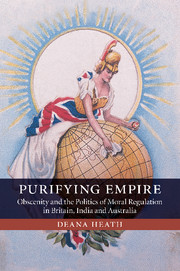Book contents
- Frontmatter
- Contents
- List of abbreviations
- Introduction: Books, boundaries and Britishness
- 1 Colonialism and governmentality
- 2 From sovereignty to governmentality: the emergence of obscenity regulation as a biopolitical project in Britain
- 3 Globalizing the local: imperial hygiene and the regulation of the obscene
- 4 Localizing the global in settler societies: regulating the obscene in Australia
- 5 Localizing the global in exploitation colonies: regulating the obscene in India
- Conclusion: Retangling empire, nation, colony and globe
- Bibliography
- Index
5 - Localizing the global in exploitation colonies: regulating the obscene in India
Published online by Cambridge University Press: 06 July 2010
- Frontmatter
- Contents
- List of abbreviations
- Introduction: Books, boundaries and Britishness
- 1 Colonialism and governmentality
- 2 From sovereignty to governmentality: the emergence of obscenity regulation as a biopolitical project in Britain
- 3 Globalizing the local: imperial hygiene and the regulation of the obscene
- 4 Localizing the global in settler societies: regulating the obscene in Australia
- 5 Localizing the global in exploitation colonies: regulating the obscene in India
- Conclusion: Retangling empire, nation, colony and globe
- Bibliography
- Index
Summary
While by the 1880s Australian colonies may have become the largest single market for British books and periodicals, India was a close second. Thanks to initiatives such as the launch of government-sponsored English education in the 1830s and the establishment of hundreds of schools and colleges, by the mid-nineteenth century India had become a growing market that British publishers were eager to cultivate. The nature of the market in India – such as its size and linguistic diversity, the differences in the types of publications that were popular there compared with Britain, and the fact that reprints (largely pirated) of British books could be sold much more cheaply than works imported from London – meant, however, that British publishers faced much stiffer competition there than in Australia. In spite of such obstacles, between 1850 and 1863 book exports from Britain to India (primarily of ‘useful’ books such as schoolbooks, histories and grammars) more than doubled, which meant that ‘a substantial amount of what Indians read, particularly through the 1870s, arrived printed and shipped from Britain’. Although the rapid expansion of the Indian publishing industry meant that book exports to India from Britain peaked in 1864 (at a total value of £313,772), the exemption of British publications from the 3 per cent ‘foreign’ print tax, coupled with imperial copyright laws – which operated as what L. T. Hergenhan has termed ‘a kind of imperialist “protection” policy’ – enabled British publishers to retain 95 per cent of the market share of book imports into India.
- Type
- Chapter
- Information
- Purifying EmpireObscenity and the Politics of Moral Regulation in Britain, India and Australia, pp. 148 - 205Publisher: Cambridge University PressPrint publication year: 2010



